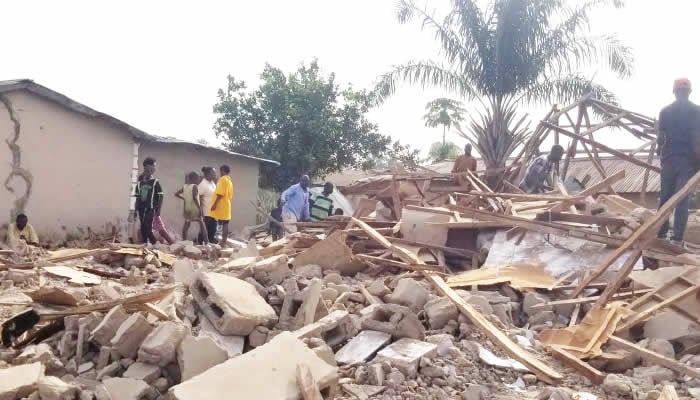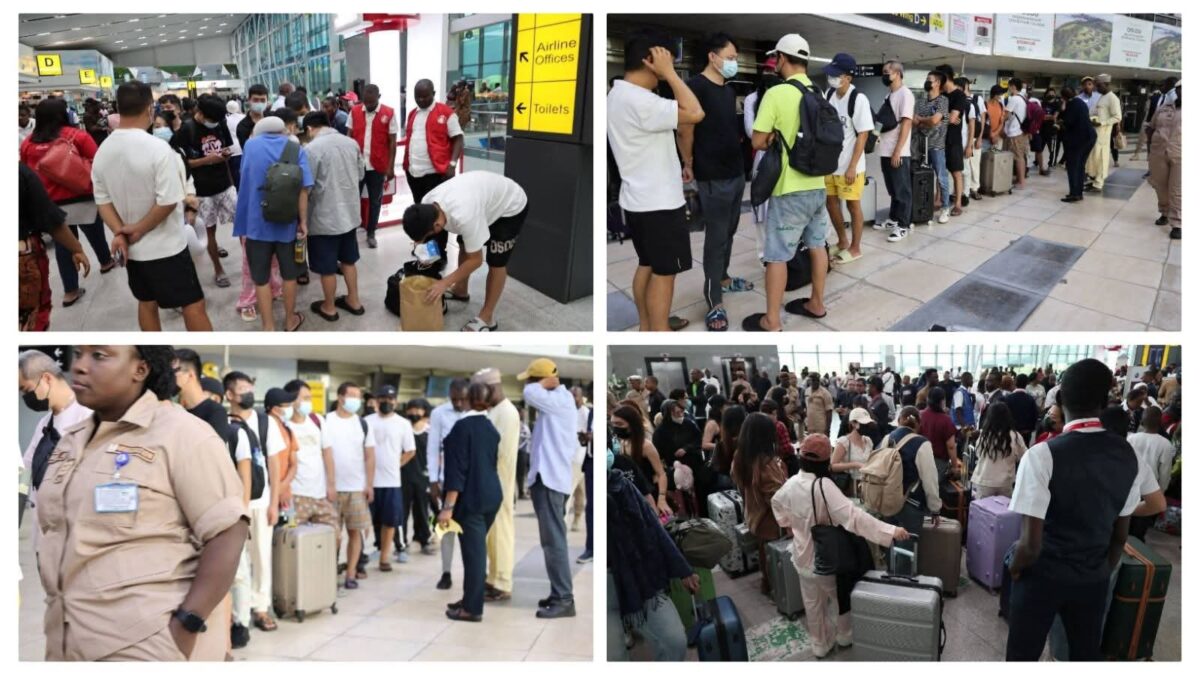
News
Nigerians in anguish over building demolition in cities

Till date, Bernard Nzerem, an engineer, is still in shock over the demolition of his over N2.2billion property at Naze, Imo State.
The property, comprising a two-storey building plaza, housing a church auditorium, another two-storey plaza, about 70 percent completed and multiple shops, was marked on June 28, 2025, and demolished on July 5, 2025, within a week notice, despite the presentation of Certificate of Occupancy and a Power of Attorney to the government agencies.
“This was not just a building. It was my entire life’s sweat,” Nzerem, an elder statesman, a member of the All Progressives Congress (APC), ruling party and an indigene of Naze, cried out.
Nzerem is not facing the trauma alone, as many shop owners and businesses within the property complex have either packed up or are still struggling to raise money to pay for new shops elsewhere.
So also are owners of the 15 buildings around the Federal Polytechnic Nekede area in Owerri, demolished in July, crying over their huge losses, especially shelter. The same scenario is playing out across the country.
For instance, house demolition is not new in Lagos State, which perhaps, accounts for the highest number of house demolitions in Nigeria, followed by Abuja.

In 2023, a five-storey building at 7 Breadfruit Street, Lagos Island, was demolished, among many over the years.
The state also marked 39 buildings for demolition, amid issuance of quit notices to owners and tenants at Oral Extension Estate, Westend and Mega Mond Estate in Eti-Osa, LGA.
The above-mentioned are few of the many property demolitions in the state over the years.
However, the brazen way a community was demolished in the Oworonshoki area of the state, this September, raised alarm over the exercise, which was intended for the residents’ good.
According to Balogun Jamiu, chairman of a Community Development Association in Oworonshoki, the residents, who are now homeless, were left in shock when bulldozers moved in at night, despite efforts at meeting the requirements of the government.
“The demolition came to us as a surprise,” he said, decrying why such an exercise was carried out at night when residents were home, sleeping and vulnerable.
Afeez Ayeni, a displaced resident, lamented that the government betrayed them as there was a gentleman agreement, which the residents were complying with.
“When the government people came from Alausa, they asked us to restructure our houses and make them stronger because the Oworonshoki area is swampy, with the closeby lagoon. We have done that and we have proof.
So, why come from behind to demolish our houses, especially now that our government does not build for the poor,” Ayeni lamented.
Following the demolition, Ayeni noted that house rent, which was already high due to the area’s proximity to the island, has more than doubled.
“Landlords are now saying that their houses are government approved and using it to increase rent in Oworo. We are now ex-landlords, and cannot even pay for a room again,” he decried.
Esther Morakinyo Fabiyi, a senior nurse at a government hospital, noted that the government keeps overlooking houses under high tension, waterways and buffer zones, which are more dangerous and rather demolishing the ones that the owners are making efforts to enhance in this hard time.
“I saw fellow mothers, who were displaced, crying.
“The government is no longer building cheap houses as Jakande did and yet it is demolishing the ones the owners have invested heavily to meet their high requirements,” she said.
Also, residents of Rimin Zakara village in Ungogo Local Government Area of Kano State, particularly, landlords, were traumatised over the demolition of over 40 houses during a recent operation by the state agencies, where no fewer than four casualties were recorded.
In defence of the demolition operation, a source at the state Ministry of Lands and Physical Planning said that the land in dispute belongs to the Bayero University Kano (BUK).
But many argued that the explanation is not enough reason for the demolition of the houses belonging to the poor.
Also, while it is about two years since the demolition of a set of buildings belonging to the Bayelsa State Government on Akassa Street, Old GRA axis of Port Harcourt, by the River State government, the evictees still recall their ordeals, amid pain.
Then, many described the demolition exercise as uncalled for, but while the two governments fought, the staff members of the Bayelsa State Liaison office in Port Harcourt, felt the impact of the eviction.
Isaac Board, a staff and evictee, recalled hurriedly packing out of the building and had no place to stay for some time.
“My family slept in the corridor of a friend’s place last night,” he lamented then.
Not only him, Woseebimu Frank-Oputu, an administrator officer at the liaison office then, sought refuge for his family at a church.
“It was my pastor that came with a truck to carry my property. My family and I are putting up in the church,” he stated then.
Though the staff members have been sorted out long ago, the worry for many is why government property and staff members were treated in such a way and that also points to why most governments don’t treat citizens with human face.
But in Abuja, many houses went down when Nasir El-Rufai was the Minister of Federal Capital Territory Abuja.
That wave of house demolition has resurfaced since Nyesom Wike became the FCT Abuja minister, with the Federal Housing Authority and the Abuja Metropolitan Management Council (AMMC) of the Federal Capital Territory Administration (FCTA), leading the onslaught.
Speaking on the issue, Andrew Osarhieme, a property expert, noted that while house owners share the blame for the demolition of their properties, the government and its multiple agencies share more of the blame for not putting the right measures in place and also being selective in the enforcement of building laws and demolition exercises.
“I live in Lagos and I have seen many houses built under high tension and the owners have been there for decades,” he said.
“Where is the government when the foundation was being laid and their agents who report fresh foundations to them for sealing off the premises if the owners have no approvals?
“The government is being more reactive than proactive in the enforcement of building laws, especially in Lagos and Abuja,” he said.
He insisted that if the government clearly marks areas and their purposes, fight enthronement, provide roads long before people start building, and deal with the omo-onile issue, there would be less properties to demolish across the country.
Mathias Egem, an Owerri-based property lawyer, also thinks that the government is reactive in the enforcement of building laws, while some demolitions are just for land grabbing.
Citing an instance with the demolition of a building allegedly used as a criminal hideout within the Ama Hausa axis in Owerri, the lawyer decried that instead of flushing the criminals out or turn the property to school or hospital, the government demolished it and probably, with an intent of taking over the land and reselling to individuals.
Countering the above, the Lagos State Building Control Agency (LASBCA) noted that its demolitions, which come after several notices, are aimed at safeguarding lives and property.
Last year, the Lagos State Government, through LASBCA, directed the removal of all illegal structures erected under high-tension and power lines, giving property owners until January 31, 2025, to comply, after which enforcement actions will commence.
For Gbolahan Oki, general manager, LASBCA, the directive aligned with the Lagos State Urban and Regional Planning and Development Law, which prohibits construction within restricted zones such as power line corridors.
Those who are crying foul today, according to the LASBCA boss, are owners who failed to adhere to the directive.
“Removing illegal structures is a crucial step in preventing tragedies caused by electrical hazards,” Oki stated.
“High-tension power lines transmit electricity at extremely high voltages, and any structure within their clearance zone poses serious risks, including electrocution, power surges, fires, and infrastructural damage due to safety violations,” he added.
Also, to ensure safety of lives and property across the state, in 2024, Babajide Olusola Sanwo-Olu, governor of Lagos State, granted amnesty to property owners to regularize their documents, which was extended to December 31, 2024, after which the LASBCA commenced enforcement, starting with Ogudu GRA.
Reviewing the exercise, LASBCA has noted that the enforcement drive is restoring order to Lagos physical planning, amid preventing structural hazards, such as recurring building collapse.
The Lagos State government has also taken safety further and started demolishing unapproved buildings following the expiration of the amnesty period granted by Governor Babajide Sanwo-Olu.
For the Federal Housing Authority (FHA), there is nothing wrong with demolishing buildings, especially when there is a need such as structural failure, which then requires controlled demolition.
Based on the above and for the safety of the residents, the FHA has carried many controlled house demolitions, especially in Abuja.
The most recent, according to the housing authority, was on March 24, 2025, when it demolished one of the authority’s buildings in Gwarinpa Estate, Abuja; a block consisting of six 3-bedroom flats.
Ojo, managing director and chief executive of FHA, explained that the authority considered the safety of human lives over any other thing in the demolition of the block due to structural defects.
For those accusing the government of being reactive, the FHA boss insisted that his management cannot wait until there is a disaster before acting, hence, proactive steps have been taken to salvage the situation.
The FHA also cleared the air on fear of forfeiture of properties when demolished, citing the demolition of one the 24 two-storey buildings illegally constructed on a waterway in Guzape District, Abuja.
The FHA boss owned up that the dilapidated buildings were FHA’s, but assured that the authority would complete the new building in one year and all the allottees would get back their houses at no cost.
While the above sounds interesting, considering the many cases where house owners and allottees often lose after demolition, the court is also offering respect to some owners who still have faith in the legal system and have taken legal actions against the government.
In July, an Abuja High Court declared recent demolitions of homes across the FCT illegal.
It also ordered the Federal Capital Development Authority (FCDA), responsible for the demolition, to pay N200?million to people whose homes were wrongly destroyed.
Though the case dated back to 2023 when the FCDA was demolishing buildings alleged to be on government land, it is justice at last for home owners, who despite having valid title documents or were in the process of securing them, lost their houses to the demolition exercise.
The ruling, according to Egem, will curb the excesses of government agencies, which often enforce laws without human face.
The property lawyer decried that most of the demolitions in the country violate homeowners’ rights to fair notice and a hearing.
“As Nigerians, part of our fundamental rights is the right to property. But our governments often act as if the citizens should not own property.
“What they should do is to harmonise property laws and give them a human face because many pour their life savings into their buildings and also depend on them for earnings, especially at old age,” he said.
He urged for a win-win bargain, as most owners of demolished buildings do not live long after their properties are gone and land grabbing is on the rise due to many demolition exercises in the country.
Osarhieme called for harmonising of building laws, easy facilitation of necessary documents and approvals and reducing of the too many agencies In building regulations in the country, especially Lagos State.
Egem urged for stiffer laws against land grabbing and use of demolition as political weapons by government officials.
Harry Emetuma, a senior banker and house owner, urged would-be landlords to start with documentation and authorisation to avoid unnecessary harassment from the many and yet to establish government building regulatory agencies. (BusinessDay)
News
#FreeNnamdiKanu Protest: Sowore vows to proceed with protest despite court order, police warning

…nothing can stop this mass movement, October 20 #FreeNnamdiKanuNow remains sacrosanct, he says
Human rights activist and former presidential candidate Omoyele Sowore has declared his intention to go ahead with the planned #FreeNnamdiKanuNow protest on Monday, October 20, in defiance of a Federal High Court order restricting demonstrations around key government sites in Abuja.
The protest is aimed at demanding the release of Nnamdi Kanu, leader of the Indigenous People of Biafra (IPOB), who has been in detention since his controversial extradition from Kenya in 2021 and is currently facing terrorism-related charges.
In a post on X (formerly Twitter), Sowore, who contested the 2023 presidential election under the African Action Congress (AAC), stated that his legal team, comprising 115 lawyers, was prepared to challenge the court order once formally served.
“Our legal team will challenge any alleged court order the moment we are served on Monday,” Sowore said.
“But let it be known that nothing can stop this mass movement. October 20 #FreeNnamdiKanuNow remains sacrosanct. We march peacefully, lawfully, and powerfully.”
The Nigeria Police Force, in a statement by its spokesperson Benjamin Hundeyin, reiterated its warning to all groups planning public demonstrations to comply with the subsisting court order.

The restriction applies to protests within and around sensitive areas such as the Aso Rock Presidential Villa, National Assembly, Force Headquarters, Eagle Square, and Shehu Shagari Way.
The court order, issued by Justice M. Umar of the Federal High Court, Abuja, arose from the case Federal Republic of Nigeria v. Omoyele Sowore & 4 others and prohibits Sowore and any affiliated individuals or groups from organizing protests in the specified zones.
“The police recognize and respect the constitutional right to peaceful assembly,” the statement noted.
“However, such rights must be exercised responsibly and within the confines of the law.”
The statement added that any attempt to breach the order or incite unrest would be met with legal consequences, as the Force remains committed to maintaining public safety and order.
Reacting to the police stance, Sowore accused the authorities of selective enforcement and “glaring hypocrisy.”
“I’m glad to see that the Nigeria Police have finally shown some respect for the constitutional right to freedom of assembly,” he said.
“But if a court order truly exists restricting protests near Aso Rock, why hasn’t the same police force obtained a similar order against those who have been protesting against Nnamdi Kanu’s release for three straight days?”
He questioned what he described as “undeniable double standards” in how different protest groups are treated.
Police spokesperson Hundeyin confirmed that the Inspector-General of Police, Kayode Egbetokun, has instructed the FCT Commissioner of Police to ensure full enforcement of the court directive, including increased security presence at strategic locations in the capital.
Authorities also cautioned against any attempt by either protesters or counter-protesters to disrupt peace, vowing to impose penalties on violators.
Residents of Abuja were assured of adequate security arrangements to protect lives and property during the protest period.
News
Ned Nwoko breaks silence on Regina Daniels’ domestic violence allegations

Businessman and politician, Senator Ned Nwoko, has addressed the viral video showing his wife, Nollywood actress Regina Daniels, in distress.
Nwoko denied claims of domestic violence, attributing their marital crisis to her alleged struggle with drug and alcohol abuse.
In a statement released on Sunday, Nwoko said the actress’ battle with substance use had taken a toll on their marriage.
He alleged that Regina had recently become violent, assaulting three of his staff members and destroying property, including vehicles and windows, within two days.
He explained that he had urged her to continue her rehabilitation either in Asokoro or abroad, where she would have limited access to drugs, expressing concern for her wellbeing.
Nwoko further claimed that Regina had refused to take their son, Moon, to the hospital during a medical emergency and instead turned on a resident nurse who reportedly exposed her alleged drug use.

He also accused two individuals, identified as Sammy and Ann, of supplying drugs to the actress, claiming they instigated chaos in his home in his absence.
He said, “Regina was not always like this. Her current battle with drugs and alcohol abuse is the root of our problem. She must continue her rehabilitation program, or I fear for her life and safety. Now she has moved to a place where she will have unrestricted access to drugs. I have other wives, and none will ever accuse me of violence.
“Regina is the violent one here, slapping and hitting 3 staff in the past 48 hours and destroying property, including cars and windows, for no just cause. The truth is, I have set a clear condition for her to accept rehab in Asokoro or outside Nigeria especially Jordan where she will not have access to drugs.
“A clear headed regina would have taken Moon to the hospital but instead she even threatened to kill our resident nurse(for exposing her drugs abuse). While I took Moon to the hospital, a scene of chaos unfolded at home, orchestrated by Sammy, Regina’s main drug supplier. Another known supplier of drugs to Regina is the tiny evil devil called Ann.”
The politician’s statement follows a viral video of the actress that surfaced on social media on Saturday, October 18, 2025, showing her in tears and suggesting she had been physically assaulted.
In the footage, Regina can be heard saying, “In Ned Nwoko’s house, I am nothing, but in my own house, I am a Queen. Not again. I can’t stand the violence, it’s too much.”
The video, which shows people trying to restrain her while others appeared ready to intervene, has sparked widespread speculation online about trouble in her marriage.
Regina Daniels and Ned Nwoko’s union has long been a subject of public discussion, largely due to their 40-year age difference.
News
192 foreigners convicted for cyber-terrorism in Lagos deported by EFCC, NIS, NCoS

The Economic and Financial Crimes Commission (EFCC), in collaboration with the Nigerian Immigration Service (NIS) and the Nigerian Correctional Service (NCoS), has deported the remaining 51 foreign nationals convicted and sentenced for cyber-terrorism, internet fraud, and related financial crimes in Lagos, bringing the repatriation of the 192 foreigners involved in the crimes to a successful close.
The deportation exercise followed the arrest and successful prosecution of 759 suspects during a major sting operation conducted by the EFCC on December 10, 2024, at Oyin Jolayemi Street, Victoria Island, Lagos.
The deportation exercise, which began on Friday, August 15, 2025, followed the conviction of the offenders by the Federal High Court in Lagos for offences bordering on cybercrime, money laundering, and ponzi scheme operations.
The first batch of 42 convicts comprising Chinese and Filipino nationals was deported on August 15, 2025. Subsequent batches followed throughout August and September. The final batch of 51 convicts, including 50 Chinese nationals and one Tunisian, departed Nigeria on October 16, 2025, bringing the total number of repatriated foreigners to 192.
The deported convicts include nationals of China, the Philippines, Tunisia, Malaysia, Pakistan, Kyrgyzstan, and Timor-Leste. They were deported in coordinated batches between August and mid-October 2025, in accordance with court directives and immigration procedures.
All the deported convicts bagged their imprisonment when they were arrested with their Nigerian accomplices believed to be members of a sophisticated cybercrime and ponzi scheme syndicate operating under the cover of Genting International Co. Limited.

The operation , based on credible, actionable intelligence, and subsequent investigations, confirmed that the convicted foreigners were involved in large-scale online fraud, identity theft, and cyber-enabled Ponzi schemes.
Evidence revealed that they trained recruits and managed fraudulent digital platforms aimed at defrauding victims both locally and internationally.
The Nigeria Immigration Service deported them as directed by the court.
-

 News1 day ago
News1 day agoBREAKING: Coup Plot against Tinubu: 16 Military Officers arrested, detained by Defence Intelligence
-

 News1 day ago
News1 day agoBandits, illegal miners clash over gold claim 17 lives in Kaduna
-

 News1 day ago
News1 day agoMilitary capture wanted IPOB commander ‘Gentle’, 8 accomplices in Southeast raids
-

 News3 days ago
News3 days agoFive Police officers, three vigilantes killed in Zamfara bandit ambush, Gov Lawal mourns
-

 News10 hours ago
News10 hours agoNed Nwoko breaks silence on Regina Daniels’ domestic violence allegations
-

 News3 days ago
News3 days agoHow my N1billion mansion in FESTAC was demolished by FHA, Task Force in Lagos, Biz man cries out
-

 News3 days ago
News3 days agoFubara cancels Ibas’s N134bn Rivers Secretariat contract, demands refund of N20bn
-

 Politics1 day ago
Politics1 day agoFormer Enugu LG Chairman, Ezinwa, condemns PDP spokesman’s attack on Ex-Enugu Gov, Ugwuanyi





























